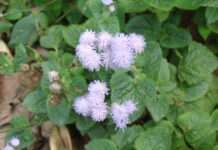Thyme is an herb from the mint family. Thymus vulgaris L. (Fam. Lamiaceae) appears to be the most popular species of thyme found in Nigeria. It is called kasahorow in Hausa.
Constituents
Thyme is rich in fibre, vitamins A and C, calcium, manganese, magnesium, copper, iron and potassium. It also contains oleanolic acid, ursolic acid, lutein, and beta-sitosterol, thymol and carvacrol.
Preparations
Thyme leaves may be used fresh, dried, or ground as an infusion or a tincture. It can be used in a steam tent for help with cold and congestion or as a mouthwash. Thyme leaves may be presented as capsules or in oils. Thyme is a wonderful ingredient that is used in cuisines around the world to flavour different kinds of meat, fish and some food.

Pharmacological actions and medicinal uses
Though it was used in embalming practices and as incense by the ancient Egyptians and ancient Greeks, respectively, thyme is fast gaining a reputation for its medicinal qualities. As far back as 370 BC, Hippocrates, also called the Father of Western Medicine, recommended thyme for respiratory ailments. Thyme was used traditionally to treat respiratory ailments like bronchitis, sore throat and cough.
Various studies found out that thyme reduced blood pressure in rats that had high blood pressure. It also reduces cholesterol and has natural diuretic properties. Reports suggest that essential oil of thyme like thymol hold many fungicidal, antibacterial and antiviral properties; thus thyme can be used as a disinfectant and is a common ingredient in mouthwash and natural deodorants. Studies also show that thyme extract can act as pesticide, repelling mosquitoes, rats, mice, and other animal pests.
In a 2013 study, carvacrol was shown to affect neuron activity in ways that boosted the subjects’ feelings of well-being, relieving headache and stress. Thyme has been found, in a study, to improve the symptoms of dyspraxia, especially in children.
Studies revealed that thyme may help prevent cancer, especially that of the colon and breast by potentially increasing cancer cell death and inhibiting the proliferation and migration of cancer cell lines.
Studies have shown that thyme oil can suppress COX-2, which is an inflammatory enzyme that leads to several inflammatory ailments; thus its usefulness in the management of painful symptoms of arthritis and gout as well as dysmenorrhea.
Thyme also supports the formation of white blood cells, thereby boosting the immune system
Thyme is known to have carminative and antispasmodic properties, and helps relieve intestinal cramps thereby boosting digestive health. Studies show that thyme might have properties to improve vision
Thyme oil is reported to heal sores, wounds, scars, and cuts. It even relieves burns and acts as a natural remedy for skin conditions such as eczema. And since thyme is high in antioxidants, it can slow down the aging process and give healthy and glowing skin. Studies show that when combined with other herbs, thyme may promote hair growth.
In manufacturing, thyme oil is used in perfumes, soaps, cosmetics and toothpastes.
Adverse effects
Thyme may slow down blood clotting. This might increase the risk of bleeding if taken in large amounts. Thyme may also cause skin irritation, allergic reactions, dermatitis and abdominal pain
Economic uses and potentials
Belgium is the third-largest importer of dried thyme in Europe. In 2019, Belgian imports of dried thyme reached 0.9 thousand tonnes, worth €2.2 million. A popular brand of dried thyme leaves cost between ₦900 – ₦1300 per 100g. A bunch of fresh thyme leaves costs ₦500. There are prospects in the cultivation, sales and use of thyme in medicine, cosmetics and beverage.













